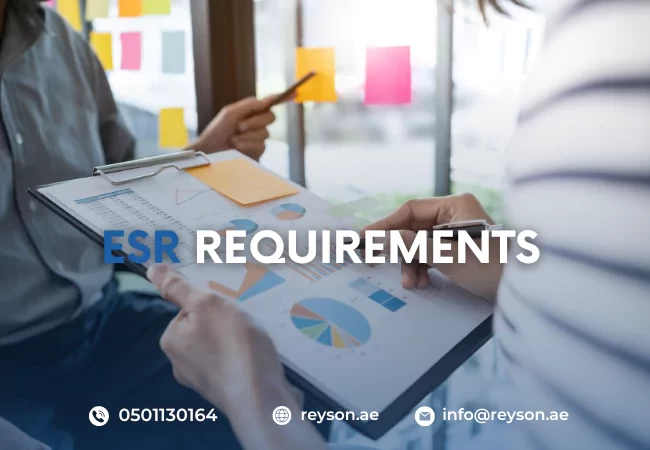Understanding ESR Requirements in the UAE
Written By Akshaya Ashok, Reviewed By Retheesh R S
Published on 19/06/2024

Economic Substance Regulations (ESR) are rules that make sure certain businesses in the UAE show they are genuinely operating there. The UAE introduced these rules in 2019 to fight against tax avoidance and make business activities more transparent. This means companies must prove they are presently working and making a real economic contribution in the UAE, not just shifting profits to avoid taxes.
Who Needs to Comply with ESR?
Economic Substance Regulations (ESR) in the UAE require all businesses in free zones, onshore, and some other areas to show they are doing real business in the country. These rules only apply to businesses that do certain ‘Relevant Activities’ as listed in the Cabinet of Ministers Resolution No. 57 of 2020. If a business does any of these activities, it must follow the ESR rules. These relevant activities include::
- Intellectual Property (IP) Business
- Shipping Business
- Headquarters Business
- Investment Fund Management Business
- Banking Business
- Service Centre Business
- Holding Company Business
- Lease/Finance Business
- Insurance Business
If a company does any of these activities, it must follow the ESR rules. This means showing that the company has real operationUAE, success in the h as having employees, spending money, and owning physical assets in the country. The goal is to make sure companies are not just set up in the UAE to avoid taxes but are doing real business there.
- Reporting Obligations: Businesses must submit annual notifications with preliminary information about their activities. This helps the authorities keep track of companies' compliance with ESR.
- Deadline for ESR Filing: Companies must submit their Economic Substance Reports within 12 months of the end of their financial year. For example, if a company’s financial year ends on December 31, 2023, they must file their ESR by December 31, 2024.
Core Income Generating Activities (CIGAs)
Article No. 3 of Resolution No. 57 also explains the Core Income Generating Activities (CIGAs) for businesses doing these relevant activities. CIGAs are the main activities that generate income for the business. Here are the CIGAs for each relevant activity:
Intellectual Property (IP) Business
- For patents or similar categories: Research and development
- For marketing intangible assets or similar categories: Marketing, branding, and distribution
- For special cases: Strategic decision-making, business management, risk management, and protecting the IP business
Shipping Business
- Managing the crew (hiring, paying)
- Maintaining and repairing ships
- Tracking and overseeing shipping processes
- Organizing voyages
- Managing goods for delivery
Headquarters Business
- Making decisions for group operations
- Spending money for group activities
- Coordinating group activities
Investment Fund Management Business
- Making decisions on investments
- Calculating reserves and risks
- Hedging positions
- Reporting to investors or regulatory authorities
Banking Business
- Raising funds
- Managing risks related to interest, currency, and credit
- Hedging positions
- Providing financial help (credits or loans)
- Managing capital
- Reporting to investors or regulatory authorities
Distribution & Service Centre Business
- Storing and transporting goods and materials
- Managing inventory
- Taking orders
- Providing consultation and administration services
Holding Company Business
- Activities related to holding company operations
Lease/Finance Business
- Agreeing on funding terms
- Acquiring and identifying assets for leasing
- Deciding lease durations and terms
- Managing agreements
- Managing risks
Insurance Business
- Calculating and predicting risks
- Insuring and re-insuring
- Signing insurance and reinsurance contracts
Who Does Not Need Economic Substance Reporting in UAE?
Any company that is an exempted licensee or has not earned any income throughout the year from its activities does not need to file and report ESR at the end of the year.
Consequences of Non-Compliance
Not following the rules can cause serious problems for companies. They might have to pay fines starting from AED 20,000. failing to comply can negatively impact a company's business standing and reputation, it will lead to losing the trust of clients and partners. If a company keeps breaking the rules, it could result in being removed from the business register. which means it can't legally operate anymore. It's really important to follow these rules so that the company stays respected and can keep doing business in the UAE.

Written By
Akshaya Ashok
Akshaya Ashok is a content writer specializing in creating content focused on accounting and auditing. With over two years of experience, she has developed expertise in crafting professional content for the financial sector.

